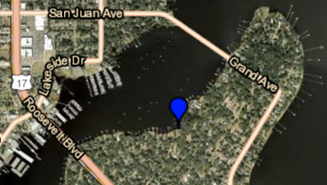It's a New Day in Public Health.
The Florida Department of Health works to protect, promote, and improve the health of all people in Florida through integrated state, county, and community efforts.
DOH-Duval Lifts Blue-Green Algae Health Alert for Ortega River - Seminole Park
September 10, 2024
Duval County, Fla. — The Florida Department of Health in Duval County (DOH-Duval) has lifted the health alert issued on August 27, 2024, for harmful blue-green algae toxins in the Ortega River – Seminole Park. Follow-up water samples taken by the Florida Department of Environmental Protection (DEP) did not detect algae toxins, indicating the public may resume water-related activities.

Ortega River - Seminole Park
It is important that the public exercise caution as blue-green algae bloom status can change when conditions are favorable. Residents and visitors are advised to avoid contact with the water if they see algae blooms.
The latest sampling results can be viewed on Protecting Florida Together.
What is Blue-Green Algae?
Blue-green algae are a type of bacteria that is common in Florida’s freshwater environments. A bloom occurs when rapid growth of algae leads to an accumulation of individual cells that discolor water and often produce floating mats that emit unpleasant odors.
Blue-green algae blooms can also appear as scum, foam, or paint on the surface of the water in various colors. To learn more about the appearance of algae blooms, visit Protecting Florida Together.
Some environmental factors that contribute to blue-green algae blooms are sunny days, warm water temperatures, still water conditions, and excess nutrients. Blooms can appear year-round but are more frequent in summer and fall. Many types of blue-green algae can produce toxins. Blue-green algae may not always be visible as a bloom, but it can still be present in the water.
Is Blue-Green Algae Harmful?
Blue-green algae can produce toxins, which can be harmful to human and pets as well as ecosystems, including fish and other aquatic animals. Sensitive individuals (e.g., children, the elderly and those who are immunocompromised) may still be at risk even at low concentrations and should avoid any exposure.
For additional information on potential health effects of algae blooms, visit DOH’s harmful algae blooms webpage.
Where Can I Find Current Water Status Information?
Current information about Florida’s water quality status and public health notifications for harmful algae blooms and beach conditions is available at Protecting Florida Together.
You can subscribe to receive notifications when water quality changes in your area.
Where Can I Report Issues Related to Algae Blooms?
- Algae Blooms: DEP monitors algae blooms and collects samples for analysis. Blooms can be reported to DEP online or by calling toll-free at 1-855-305-3903.
- Human Health Impacts: Report symptoms from exposure to a harmful algae bloom or any aquatic toxin to the Florida Poison Information Center by calling 800-222-1222 to speak to a poison specialist.
- Animal Health Impacts: Contact your veterinarian if you believe your pet has become ill after consuming or having contact with blue-green algae contaminated water.
- Fish Kills: Dead, diseased, or abnormally behaving fish or wildlife should be reported to the Florida Fish and Wildlife Conservation Commission online or at 800-636-0511.
If you have other health questions or concerns about blue-green algae, please call DOH-Duval at 904-253-1280.
About the Florida Department of Health
The Department, nationally accredited by the Public Health Accreditation Board, works to protect, promote, and improve the health of all people in Florida through integrated state, county, and community efforts.
Follow us on X at @HealthyFla and on Facebook. For more information about the Florida Department of Health, visit FloridaHealth.gov.



Connect with DOH